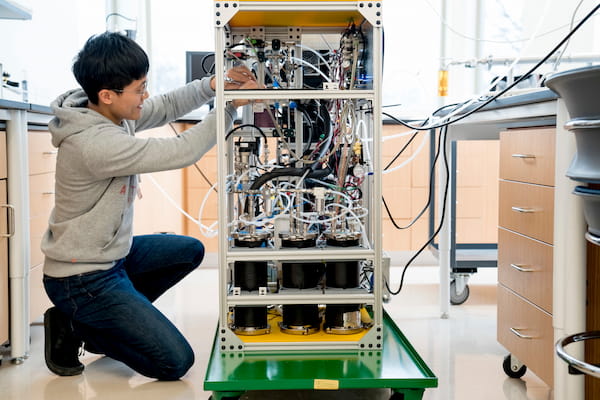It's easy to start your application today.
Research
Research Labs
Aerosol research has several state-of-the-art laboratories available for performing research in the focal areas of emphasis. Facilities are primarily located in Brauer Hall and Green Hall.

Aerosol Interdisciplinary Research Group
Atmospheric Composition Analysis Group
Led by Randall Martin, this lab applies satellite observations, global models and in situ measurements to improve understanding about the processes controlling air quality, climate and biogeochemical cycling.
The lab devotes particular attention to emissions and other processes affecting tropospheric ozone and aerosols. Satellite remote sensing is yielding unprecedented insight into global atmospheric composition by observing regions and phenomena that are otherwise difficult to observe.
Atmospheric Science & Engineering Laboratory (ASE)
Led by CASE Director Jian Wang, the broad theme of the ASE lab is to understand key processes that drive the properties, distribution and evolution of aerosols (also known as particulate matter), and to elucidate and quantify the effects of aerosols on air quality, biogeochemical cycle, hydrological cycle and climate. The overall goal is to obtain a predictive understanding of aerosol properties, processes, and effects to address the grand challenge of actionable projection of future climate and environment.
Climate and Air quality Nexus (CAN) lab
Led by Lu Xu, this lab focuses on understanding the interplay between climate change and air quality. By employing a multifaceted approach that includes laboratory experiments, field measurements, and instrument development, we aim to establish new benchmarks for coordinated technology development and environmental assessment in the fight against climate change.
Interface Research Group
Led by Elijah Thimsen, the Interface Research Group covers four distinct research areas: (1) nanocrystals and atomic layer deposition (ALD), (2) electron transport in assemblies of nanocrystals, (3) low temperature plasmas for the processing of materials and (4) photovoltaic manufacturing
Lacer Laboratory
Led by Richard Axelbaum, LACER develops novel approaches to reduce emissions from power plants. We have a global view on energy, and try not be get bogged down on what is popular, but rather focus on what we believe has long term impact.
The Jay Turner Laboratory
The Jay Turner group applies science tools such as monitoring and modeling to air quality planning and management and human exposure. We also work on green engineering including life cycle assessments for processes and products.
Research Opportunities
Our research laboratories provide various opportunities for students.
